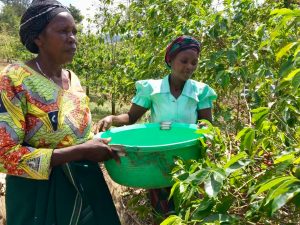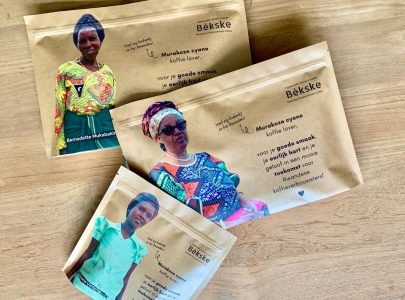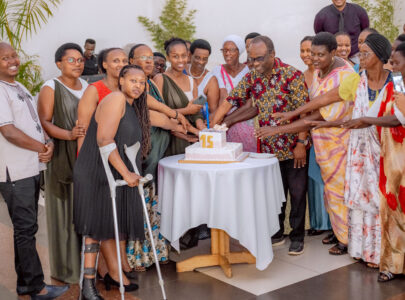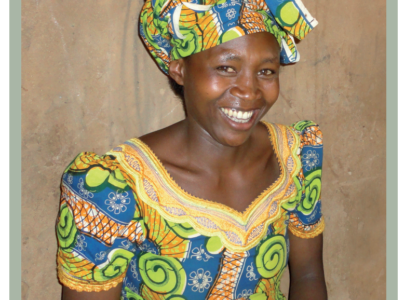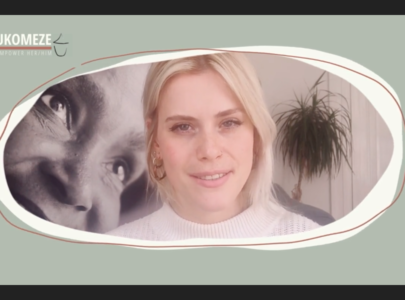Our projects are aimed at a group of survivors of sexual violence of the genocide against the Tutsi. Its purpose is – in line with sponsorships – “empowering” this group. Projects focus on livestock and agriculture, education, trade, housing and industry.
Common bond
Projects have the advantage they counteract stigmatization, expand the network of friends and “family” and provide help with trauma processing. As survivors work together in a project, a common bond is created and they (for a moment) disconnect from their traumatic experiences from 1994.
Breaking through stigmatization
In some projects other survivors of the genocide against the Tutsi and non-genocide survivors also participate. Think of perpetrators of the genocide, children who did not experience the genocide or Rwandans who did not stay in Rwanda at the time of the genocide, but returned afterwards. This breaks through stigmatization of sexual violence and Hiv/AIDS and “alleged” differences in ethnicity.
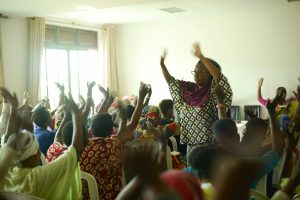
Some examples of our project concern:
Cow project
Keeping a cow has proven to be one of the most effective ways to increase the economic position and independence of women.
- Feces are used to fertilize the land;
- Dairy products are sold;
- Milk serves as a source of healthy nutrition (in particular for women who are Hiv-positive);
- Cows provide a sense of dignity, which contributes to the processing of trauma.
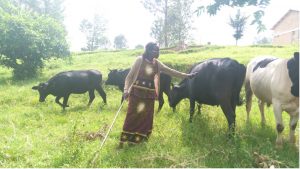
The women who qualify for this project do not just get the cow. They build a cowshed themselves, take care of the forage and follow a two-day training on livestock farming. To promote the sustainability of the project, women donate the first female calf to another genocide survivor. A larger number of women are helped by the pass-on system. Finally, they give up 10% of the sale of the first bull in favor of a fund for the community. Community members can borrow from this, which increases the community’s self-reliance. With our livestock projects, we contribute to the Sustainable Development Goals of the United Nations, in particular: SDG 1 (no poverty), SDG 3 (good health and welfare, SDG 5 (gender equality and women empowerment), and SDG 8 (economic growth and fair work).
Education project
The Mukomeze Foundation has set up educational projects in which survivors of sexual violence are supported in obtaining a bachelor’s and/or master’s degree. With our education projects, Mukomeze contributes, among other things, to SDG 4 (quality education).
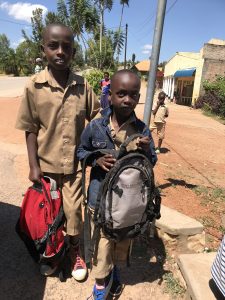
We strongly believe in the importance of a good education. Everyone deserves a fair shot at an education. Such a base will help survivors find suitable jobs in the future. This often allows them to undergo a sustainable development towards socio-economic independence. We are therefore proud that we have already been able to support 13 survivors (or children of survivors) in their studies.
We are grateful to our donors for having supported/supporting our projects (in alphabetical order):
Books 4 Life, Cordaid, COS Brabant, De Leestafel, Duncan Management BV, E.ON Benelux, Fakkels voor Vrede, Flair Fund, Gemeente Breda, Gemeente Tilburg, Horeca opleidingen in Brabant (De Rooi Pannen Breda, ROC Leijgraaf Oss en Cuijk, De Rooi Pannen Eindhoven), Imperial Tobacco Nederland, Impulsis, Kiwanis Tilburg, Meriem Foundation, Probusclub Tilburg, Rabobank Hilvarenbeek-Oisterwijk, Rabobank Breda, Rotary Club Utrecht International, Soroptimistclub NL Bommelerwaard, Soroptimistclub Flevoland Internationaal, Soroptimistclub Merwekring, Soroptimistclub Utrechtse Heuvelrug, Stapelfinanciering, Stichting Loosco Fonds, Stichting MTO, Stichting Mundico, Stichting Westeinde, Tools to Work, Translators Without Borders, Wolf Legal Publishers, and Zusters van Liefde.
More information
Would you like to know more about our projects? Or do you have ideas of your own to support the survivors? Please contact us via [email protected].
Donate
Help the women of Rwanda. Support them with a monthly or one-time donation. Look here to learn more about donating to Mukomeze.
Latest news
30th Commemoration of the Genocide against the Tutsi
[April 7, 2024] During the 30th commemoration of the Genocide against the Tutsis in Rwanda in 1994, we would ...
Read more→15 years Mukomeze celebrations
[Augustus 2023] On 18 August we celebrated 15 years of Mukomeze-Solace Ministries in Rwanda. Below follows an impression of ...
Read more→Our annual report over 2022!
[30 June 2023] The Mukomeze Foundation has published its annual report over 2022. You can read all about the ...
Read more→Video: “I am proud of our Mukomeze family”
[5 August 2022] With pride we present ourselves in this video: “I am proud of our Mukomeze family”. The ...
Read more→